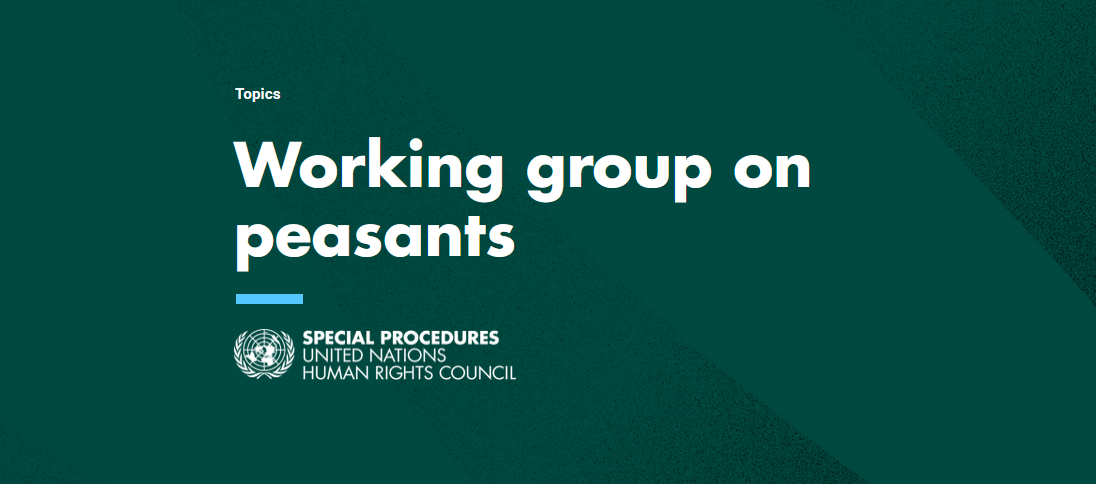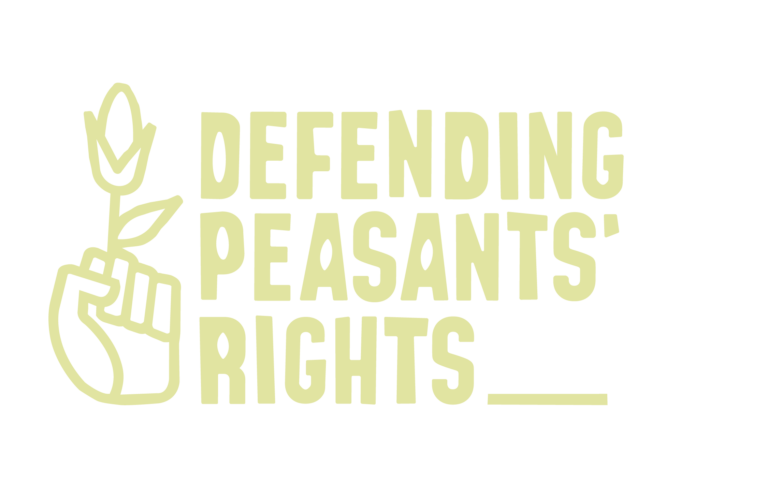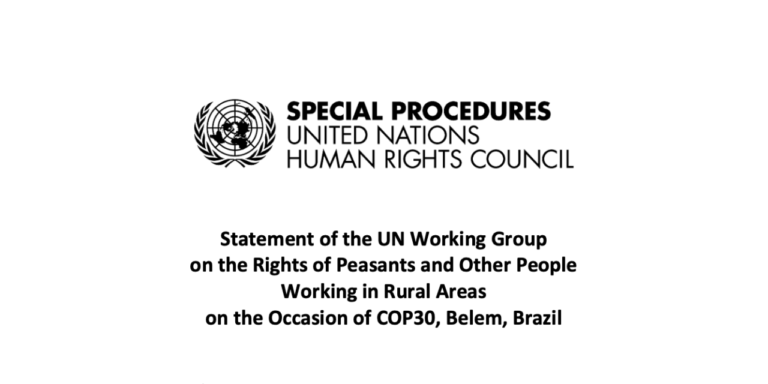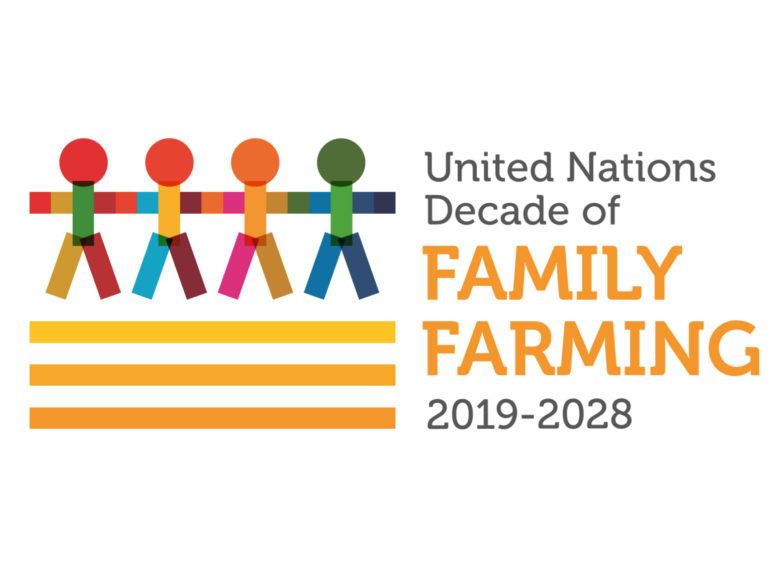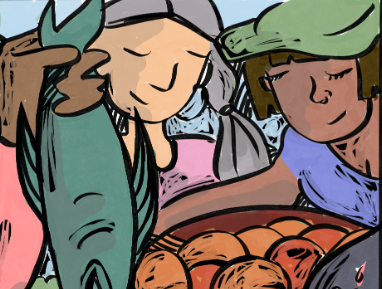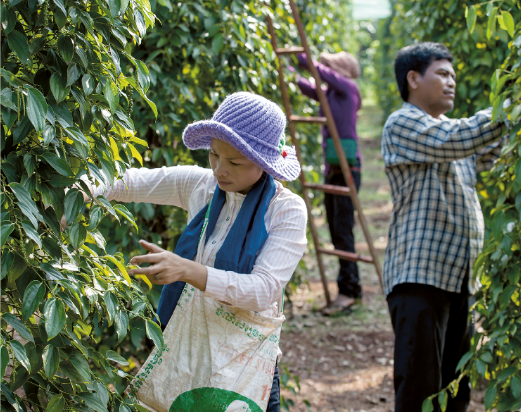Ecuador postpones visit by UN Working Group on peasants’ rights
Defending Peasants’ Rights hereby republishes the statement released on the website of the UN Office of the High Commissioner for Human Rights (available here).
Editor’s note:
The experts’ visit, initially planned for November 4–14, 2025, was postponed despite its critical timing, following recent protests in Ecuador that were met with a state of emergency and a crackdown in which Indigenous, rural and environmental organisations—amongst key representatives of UNDROP rights-holders— were accused of “terrorism” and had their bank accounts frozen. These demonstrations raised urgent alarms about pressing issues directly linked to the UNDROP, such as rights to land, water, and a healthy environment, which were threatened by the termination of fuel subsidies and the advancement of mining projects on Indigenous lands.
In this context, the experts explained that a visit would have provided a vital opportunity to work with the Government to find human rights–based responses to these concerns.
They emphasised that Ecuador has repeatedly reaffirmed its commitment to the UN Declaration on the Rights of Peasants and Other People Working in Rural Areas (UNDROP). The experts further highlighted that this declaration offers a clear framework for tackling deep-rooted inequalities faced by rural communities and can help shape public policies that promote food sovereignty, environmental preservation, and social justice.
Read full statement:
05 November 2025
GENEVA – A group of human rights experts* today announced that their visit to Ecuador, due to take place from 4 to 14 November 2025, has been cancelled after the Government requested to reschedule it for the second half of 2026.
“The recent protests across the country reflect deep-rooted concerns about land and water rights, environmental degradation, and relate to increased cost of living and growing insecurity and violence,” said the UN Working Group on the rights of peasants and other people working in rural areas.
“A country visit at this moment would have allowed us to work collaboratively with the Government to identify human rights solutions to these pressing issues.”
The experts noted that the visit would have been a timely and valuable opportunity for constructive engagement with the Government and communities on advancing the rights of peasants and rural workers in Ecuador.
“The country visit would have provided an important platform to identify human rights-based approaches to the pressing challenges currently faced by peasant and Indigenous communities in Ecuador,” the Working Group said. “In light of the recent protests and the government’s response to them, this dialogue would have been particularly relevant to discuss ways to address underlying grievances and strengthen trust between communities and institutions.”
The experts reiterated that Ecuador’s progressive recognition of the UN Declaration on the Rights of Peasants and Other People Working in Rural Areas (UNDROP) offers a concrete and principled roadmap for addressing the structural inequalities and injustices affecting peasant communities, Indigenous Peoples, small scale fishers and rural workers.
“We remain convinced that implementing UNDROP can help guide policies to ensure food sovereignty, environmental protection, and social justice,” the Working Group said, expressing readiness to support and cooperate with Ecuadorian authorities in the promotion of the rights of peasants and rural workers in the country.
The Working Group on Peasants and other people working in rural areas is comprised of five independent experts from all regions of the world. The Chair-Rapporteur is Carlos Duarte (Colombia), other members are Geneviève Savigny (France); Shalmali Guttal (India), Uche Ewelukwa Ofodile (Nigeria) and Davit Hakobyan (Armenia).
Special Rapporteurs/Independent Experts/Working Groups are independent human rights experts appointed by the United Nations Human Rights Council. Together, these experts are referred to as the Special Procedures of the Human Rights Council. Special Procedures experts work on a voluntary basis; they are not UN staff and do not receive a salary for their work. While the UN Human Rights office acts as the secretariat for Special Procedures, the experts serve in their individual capacity and are independent from any government or organization, including OHCHR and the UN. Any views or opinions presented are solely those of the author and do not necessarily represent those of the UN or OHCHR.
Country-specific observations and recommendations by the UN human rights mechanisms, including the special procedures, the treaty bodies and the Universal Periodic Review, can be found on the Universal Human Rights Index https://uhri.ohchr.org/en/.
UN Human Rights, country page – https://www.ohchr.org/en/countries/ecuador
For inquiries and media requests, please contact: Jamshid GAZIYEV, Secretary of the Working Group on peasants and rural workers ([email protected]).
For media inquiries related to other UN independent experts please contact Maya Derouaz ([email protected]) or Dharisha Indraguptha ([email protected]).
Follow news related to the UN’s independent human rights experts on X: @UN_SPExperts.

